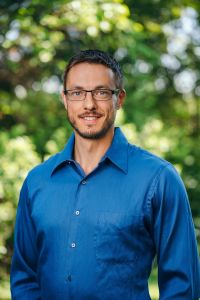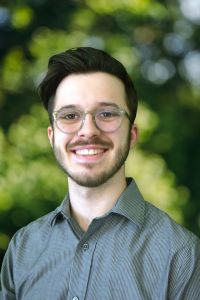

Two alumni of the renewable energy technology program at Madison Area Technical College (Madison College) credit the industry connections and experiential learning opportunities that Professor Kenneth Walz makes available to students as essential for positive turns in their career paths.
For John Schwarzmeier, leader of the Systems Integration Group at SunPeak, the critical experience was presenting his honors project—a gravitational potential energy storage device he created—to the renewable energy program’s industry advisory committee in 2018. Afterward several employers chatted with him about his design, and a few weeks later he “was carrying panels on a roof” for SunPeak. His troubleshooting acumen and other skills helped Schwarzmeier advance quickly from an entry-level solar installer position to leading commissioning and maintenance operations for the company’s large solar energy projects.
Alex Thomas attributes his 2020 internship working alongside Schwarzmeier at SunPeak, where he too is now employed fulltime, to a sequence of events that began when he showed up to help with a research project. The optional field activity, which Walz made available to his renewable energy students, was to help him install a small solar array. It tested whether aluminum sheets underneath bifacial photovoltaic (PV) panels would increase their energy production and compared the snow melting performance of bifacial panels with traditional, single-sided PV modules. Thomas was subsequently invited to volunteer at RENEW Wisconsin’s Renewable Energy Summit in January 2020. There he met employers and leaders of the Midwest Renewable Energy Association (MREA). During conversations he learned about a paid internship program funded by the Department of Energy that MREA administers with Wisconsin Technical Colleges. By late August Thomas had secured an internship at SunPeak.
During separate interviews via Zoom both Schwarzmeier and Thomas encouraged ATE educators to offer students authentic research experiences and opportunities to meet employers as part of their technician education programs.
Interestingly, both men had earned bachelor’s degrees and spent time in the workforce before enrolling in the renewable energy certificate programs that Walz developed as the principal investigator of the Center for Renewable Energy Advanced Technological Education Center (CREATE) with support from the National Science Foundation’s Advanced Technological Education program.
Tailoring lessons & interactions
“Ken [Walz] and the other people in the renewable energy program, they are some of the best educators I had at Madison College and frankly they did a lot better than UW [University of Wisconsin-Madison] faculty at bridging the gap between theory and application. They really did a good job at knowing who they were teaching and tailoring the lessons and the individual interactions so the student got the most out of it,” Schwarzmeier said.
Schwarzmeier added three certificates—wind, solar, and renewable energy—to his associate degree in industrial maintenance technology because he was looking for real-world applications of the weather knowledge he learned for his UW bachelor’s degree in atmospheric and oceanic science. After graduating from UW he had lived abroad for several years, making a living as a professional online poker player.
“What I was looking for in this second go round with higher education was the hands-on aspect and having field work and lab settings where we were actually climbing wind turbines and were setting up solar PV systems ... That was really memorable—just the hands-on experience,” he said.
Schwarzmeier also remembers talking to Walz after class about statistical research, technical things, and his honors project experiments that grew from a research project requirement in the introductory renewable energy course.
“He really helped me critique a lot of things and analyze the math. So I think just the way he approaches different students and helps them get to know stuff in his course work was really excellent,” he said.
Connecting with industry
Thomas, who completed the three-semester renewable energy certificate in December 2020, praised both the program’s industry connections and the way Walz and other faculty kept the program going despite COVID-related challenges.
“They did a really great job keeping that community going even online, which is really kind of an odd way to learn such a physical task of installing PV systems,” he said, adding, “It definitely set me up for success and opened a lot of doors.”
Thomas enrolled in Madison College in 2019 in the hope that additional renewable energy knowledge and technical skills would strengthen his resume for communications jobs with government environmental agencies. Those type of positions were the target of his job search after graduating from Edgewood College in 2018 with an English major and minor in science communication. Thomas was working as a bartender when an Edgewood College professor suggested he contact Walz and enroll in the renewable energy program at Madison College.
Describing himself as “open to whatever opportunity came about” Thomas said that the technical courses he took and the industry people he met as a renewable energy student prompted him to explore becoming a licensed electrician and PV installer. What has happened as a result of the Madison College program has exceeded his expectations.
“I feel like I can draw a line from helping out with that first lab installation with the bifacial panels with snow melt all the way until getting this position with Sun Peak,” Thomas said. At the Renewable Energy Summit he was invited to attend as result of helping with the research project Walz introduced him to employers, Madison College alumni, policymakers, and renewable energy advocates. Those interactions led him to explore a number of opportunities including MREA’s paid internships.
When he began his internship at SunPeak, Thomas was assigned to assist Schwarzmeier with operations and maintenance tasks.
Though it had been just two years since he graduated from Madison College, Schwarzmeier said he felt Thomas was “the next generation” of people who did something else after college and came to renewable energy because of a passion for the environment. “He showed promise, and helped me out doing things in the field and got a little taste of all aspects of the business,” Schwarzmeier said.
When Schwarzmeier learned that in addition to his new technical skills Thomas had edited the Edgewood College newspaper, had taken graphic design courses and had taught himself several software programs, he recommended Thomas for an opening in the company’s Project Development Department.
Since becoming a full-time project development associate in January, Thomas has learned the 3-D solar performance modeling software program HelioScope. He uses it to create 3-D maps of buildings for graphic displays of energy usage, which SunPeak includes its solar energy system proposals.
“It’s challenging work,” he said, with a smile during the video conference call and affirmation that he’s glad to have it.

 Subscribe
Subscribe


 See More ATE Impacts
See More ATE Impacts

Comments
There are no comments yet for this entry. Please Log In to post one.